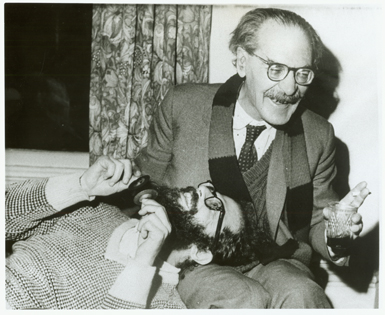Bunting and Biography
16 January 2014 by Infinite Ideas in Basil Bunting and A strong song tows us, Book publishing
by Richard Burton, author of A strong song tows us
The old man in August Kleinzahler’s beautiful poem ‘The Bench’ is the poet Basil Bunting, the location Victoria, British Columbia, during Bunting’s disastrous winter at the University of Victoria in 1971-72 (LRB, 9 January). After a spectacular falling out with Robin Skelton, Bunting was left isolated, lonely and bitter, but Kleinzahler shows him keeping his eye on the horizon. Bunting’s preference was for the big picture but he also had a keen appreciation of the absurd and he would have relished some of the eccentricities in Michael Hofmann’s review of my Life of Bunting in the same issue. I am still trying to work out what an ‘exfoliated, whiskery’ biography might look like, and whether or not I have written one, and whether or not it is a good thing if I have; and I’m sure that Bunting would have found the comparison of the poet to Tintin as bewildering as I do. It’s not for me to quibble with Hofmann’s interpretations but I should correct the impression he may have left that Bunting’s relationship with biography was straightforward, because it wasn’t.
Hofmann writes that mine is the first ‘proper’ biography of Bunting but that I add little to his understanding of its subject beyond that provided by Victoria Forde, Richard Caddel and Carroll Terrell. He doesn’t mention Keith Alldritt’s The Poet as Spy: The Life and Wild Times of Basil Bunting, which was published in 1998. Forde and Terrell did include biographical chapters in their studies of the poet, and a clue to the strengths and weaknesses of Basil Bunting: A Northern Life by Caddel and Anthony Flowers, which is just 64 pages long and heavily illustrated, is embedded in its subtitle. Alldritt’s was in fact the first ‘proper’ biography but it is so heavily marbled with rumour and speculation that it is almost worthless. It was reading Alldritt’s book (which if anything damaged Bunting’s reputation) that stung me into writing A Strong Song Tows Us.
More important, Hofmann writes that I pay ‘lip service to Bunting’s personal opposition to biography’ and that I go ‘so far as to borrow the five parts of Briggflatts’ for my narrative structure. That often expressed objection is, however, compromised by Bunting’s full participation in the publication of Jonathan Williams’s Descant on Rawthey’s Madrigal, which told his story up to the mid-1960s, by his biographical introduction to the poems of Joseph Skipsey in 1976, in which he confesses to having sought out Skipsey’s surviving relatives for their memories, and by the fact that the subtitle of Briggflatts itself is ‘An Autobiography’. Bunting was not above using biography in pursuit of what he saw as a good cause. He did this because he recognised that the way to interest people in the work of a neglected poet is to tell his story. My ‘borrowing’ from Briggflatts was intended as a courtesy and recognition of Bunting’s ambiguous relationship with biography. Hofmann doesn’t seem to be too comfortable around ambiguity. He chides me for not telling readers whether Bunting was arrested in Paris in 1923 for biting a policeman’s nose or for kicking him in the pants. Nobody knows, and as the gritty wanderer of ‘The Bench’ would have been the first to insist, it really doesn’t matter.
For more information on the life and work of Basil Bunting, visit our dedicated site at www.basilbunting.com.

